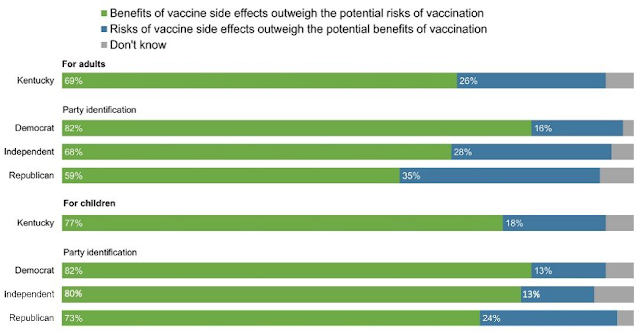Risks of vaccines are very small, but one in four Kentucky adults think those risks outweigh the benefits of getting vaccinated

Foundation for a Healthy Kentucky poll, Feb. 11-March 12, 2021; error margin +/-3.5 percentage points
—–
By Melissa Patrick
Kentucky Health News
One in four Kentucky adults told pollsters last winter that the benefits of vaccines for adults are outweighed by the risks of taking them. That poses an obstacle to getting the state protected from stronger variants of the coronavirus, and raising the risks that other diseases may spread.
The poll was taken for the Foundation for Healthy Kentucky Feb. 11 through March 12, when vaccines for the virus were becoming widely available. It did not ask about those vaccines, but about vaccines generally.
Sixty-nine percent of adults said the benefits of vaccines for adults outweigh the risks of vaccine side effects, while 26% said the risks outweigh the benefits. On vaccines for children, 77% said the benefits outweigh the risks while 18% said the risks outweigh the benefits.
“I think this is a big issue, because it’s been pretty clearly proved by science across the board that vaccines are not only safe, but are crucial to the health and well-being of our citizens and our society,” Foundation President and CEO Ben Chandler told reporters Tuesday.
“What we’ve got, essentially, is a quarter of the entire population here in Kentucky who, I would interpret, believes that the vaccines, all vaccines, are essentially dangerous, and they’re concerned about taking them. . . . So we got some educating to do.”
The poll indicated that most Kentuckians have plenty of information about the pros and cons of vaccines. When asked if they had heard about the advantages and disadvantages of vaccines for both adults and children, 84% for adults and 80% for children said they had heard either a “great deal” or a “fair amount” of information on the topic.
But they may not be getting the right information, Chandler said: “We’ve got a problem with the internet, with the dissemination of information throughout the society.” He encouraged Kentuckians to seek information from their health-care providers and the Centers for Disease Control and Prevention, which he called “the best source that we’ve got.”
Asked if he thought the poll findings about vaccines in general were driven by discussions about the coronavirus vaccines, Chandler said that’s possible. “But the health concerns go beyond Covid,” he said. “If the vaccine controversies that have taken place cause people to not get their regular vaccines in the years ahead, we are going to be dealing with some serious health problems across the board here in Kentucky, and probably across the country.”
 |
| Washington Post charts, adapted by KHN; click on them to enlarge. |
Chandler spoke out as vaccine uptake in the state is waning again, and public-health officials continue to work to get 70% of the state’s population vaccinated, the level needed to reach herd immunity.
The latest CDC figures, as reported by The Washington Post, say Kentucky’s seven-day average is 12,207 per day, down from an average of 18,369 on June 18. The latest daily figure, subject to revision, was 5,347.
The CDC says more than 2.1 million Kentuckians have received at least one dose of a vaccine. That’s 48.4% of the state’s population; 42.3% are fully vaccinated. Full-vaccination rates range from 19% in Spencer County to 58% in Franklin County.
Polls on vaccines have found major differences among political parties. In the foundation’s poll, 82% of Democrats said the benefits of vaccines outweigh the potential risk for adults; that was true of 68% of independents and 59% of Republicans.
When asked about children’s vaccines, the results were closer, with 82% of Democrats, 80% of independents and 73% of Republicans saying the benefits of vaccines outweigh the potential risks.
Chandler, a former Democratic attorney general and congressman, summed up polling on the issue: “People in rural Kentucky, people with lower educational levels, white men, typically Republicans, are more hesitant and more concerned about the efficacy, not only of the Covid vaccine, but of all vaccines.”
The foundation’s annual health policy forum, to be held Sept. 20, will focus on vaccines.
The poll, conducted by the Institute for Policy Research at the University of Cincinnati, included more than 800 adults who were contacted by both landline and cellphones. Its margin of error is plus or minus 3.5 percentage points for each result.
